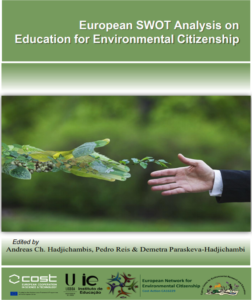Chapter 22: SWOT Analysis of Education for Environmental Citizenship – Short SWEDISH Report
Per Sund & Niklas Gericke
Abstract: The two responses altogether do not really see the any major benefits of introducing Education for Environmental Citizenship in Sweden. There are great similarities to Citizenship Education (CE), Environmental Education (EE) and especially to Education for Sustainable Development (ESD). One respondent pointed out the benefits of more action-oriented teaching towards the surrounding society as one positive possibility by the implementation of Education for Environmental Citizenship. The other respondent was troubled by the fact that a ‘north’ power perspective/worldview could be disseminated in schools if not a critical internal discussion is raised early in the implementation discussions of Education for Environmental Citizenship. However, there are some positive points about wholeness and action-oriented teaching and a possibility to better enhance teacher collaboration, increased sense of meaningfulness and relevance of education for all stakeholders involved. A raised weakness or concern is perhaps a too normative teaching/activist approach, one that research has shown is not an effective way to involve young people to work on societal changes. To summarize the overall result, there are some positive thoughts about the contribution of Education for Environmental Citizen-ship by a Swedish professional and researcher context but it seems not a priority on a national level.

